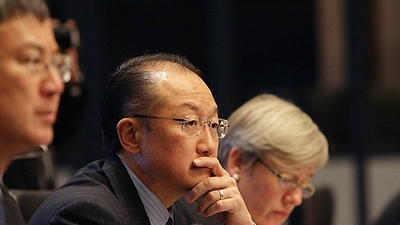Conversations about inclusive green growth and climate change filled the corridors and conference rooms of the World Bank/IMF Annual Meetings this week in Tokyo.
At the Second Ministerial Dialogue on Sustainable Development, on October 12, more than 40 ministers of finance and development discussed their experiences applying regulations, green taxes, and the incentives to manage tradeoffs.
They thanked Japan for hosting the event, which provide an opportunity to talk with one another about green growth fiscal policies and issues such as support for natural capital accounting mechanisms and fossil fuel subsidy reform. Some minsters spoke of the increasing prevalence of extreme weather, the unprecedented number of natural disasters in recent years, and the challenge of both strengthening disaster prevention and maintaining sustainability.
“We may not have all the solutions to creating growth and managing the combined challenges of food and energy and water insecurity in an increasingly uncertain world,” said World Bank Vice President for Sustainable Development Rachel Kyte. “But the countries here have demonstrated an extraordinary consistency in their definition of the problems we face and willingness to share experience and lessons in the struggle to create sustainable development.”
Financing climate change
Al Attiyah, Minister of Finance and Sustainable Development of Qatar and host of the upcoming Doha Climate Change Conference, COP 18, brought climate change to the fore, calling for agreement on a 2nd Commitment Period of the Kyoto Protocol and a streamlined and inclusive negotiation process.
He also called on developed countries to consider scaling up support for climate action to fill the gap until the Green Climate Fund is fully operational.
Securing the finance to support developing countries in their mitigation and adaptation efforts will be a critical aspect of the Doha negotiations, he said. In particular, he noted, developing countries will see interim financing as a test of the global commitment to combating climate change and critical to the success of a global agreement.
Germany, in a move to begin filling that gap, announced at the same time a 9.4 million Euro contribution to climate investment readiness. The contribution through the Climate Investment Funds is designed to help developing countries get ready to use climate financing. The funds will be used for strategic advice on mitigation and adaptation and to help countries prepare programs so they can effectively access future Green Climate Funds. Dirk Niebel, Germany’s Federal Minister of Economic Cooperation and Development invited others to add their support.



